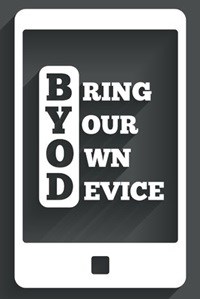
In addition, in today's interconnected world, the lines between personal and corporate digital lives are blurring, and users no longer wish to maintain separate devices for personal and official use. Organisations, therefore, need to be able to support the Bring Your Own Device (BYOD) trend to ensure employees are kept happy and productivity levels can be maximised, among other benefits.
Devices today integrate the right combination of style, power and performance to enable them to be used across business and personal applications. The supporting technology ensures enterprise BYOD is secure, productive and effective.
Mobility is, without doubt, the future of workforce technology and organisations need to brace themselves to support BYOD now to leverage the benefits and cater to increasing demand in the future. Mobile devices, including phones, tablets and phablet hybrids, now incorporate technology such as mobile broadband, location services, Wi-Fi, Near-Field Communication (NFC), Bluetooth, encryption capabilities, remote device management capability, high definition cameras, biometric authentication, voice to text, secure operating systems and more.
Enterprises can leverage these features for many innovative applications. For example, cameras can be used for document scanning, NFC chips for access control, location services for parking space allocation and more. The possibilities are practically limitless.
However, while mobile technology has evolved to be more powerful than ever before and have incorporated many new features that can be leveraged by the enterprise, having the best mobile technology alone is not sufficient to support enterprise BYOD. It is essential to also put in place a robust enterprise infrastructure for the management of BYOD that also provides the required flexibility to enable employees to utilise the same device for personal applications.
Enterprises must, therefore, build a dedicated infrastructure to support BYOD, whether this is delivered on premise or via cloud. Some aspects required include Mobile Device Management (MDM), mobile application management and mobile content management, document and content sharing solutions, Exchange ActiveSync for emails, effective authentication tools and productivity solutions such as the Microsoft Office Suite.
In addition, organisations need to protect corporate information stored and accessed on mobile devices from a variety of threats including theft, hackers, viruses, cyberattacks and more. To do this it is vital for enterprises to define a BYOD program and, based on the final scope, a comprehensive BYOD policy should be documented. As part of the BYOD policy, adequate security process and technology controls should be identified and implemented for user management, device management, data management and the procedure for BYOD onboarding and acceptance, among other areas.

BYOD has numerous benefits for organisations, including its ability to enhance employee productivity, improve the user experience and deliver cost optimisation. For example, many large enterprises currently spend considerable resources in terms of both people and infrastructure on managing travel and expenses. Utilising mobile apps, however, can yield significant benefits to this process.
The employee can use an enterprise travel app on his/her mobile device to book travel tickets and hotels, hire a cab, receive e-tickets, etc. through one centralised interface. While in transit, the employee can change local travel plans at their destination dynamically on their mobile device. Once travel is completed, expense bills can be uploaded to the app and submitted automatically to the finance team. Not only does such a mobile app automate several processes, it also creates an enriched user experience, reduces transaction time and helps optimise costing.
Another example of mobility can be seen in guest management, which is often a complicated process involving security. The host organisation requires entry passes to be generated, escorts to be organised and access to be controlled to certain authorised guest areas. A mobile app can be used to simplify this process. Guests simply download the app and request access, which is then sent to the host for approval. On approval, the guest can be sent a QR code, which becomes a virtual gate pass. During the visit, guests are auto navigated to the host's location using the location services of the guest's phone. The app can also be used to give the guest Wi-Fi access and the QR code will only work for areas where they are authorised to visit.
These are just two examples of how mobility and enterprise applications can be used in innovative ways to enhance user experience and improve automation. As apps become increasingly sophisticated, they will also become more location and context-sensitive, delivering endless possibilities for productivity and experience improvements.
Ultimately, to leverage the future of mobility, enterprises need to create a mobile ecosystem that delivers a rich user experience and eases processes that are typically manual and cumbersome. This will not only assist enterprises to leverage the greatest benefit, it will also ensure maximum user adoption. This, in turn, will maximise productivity gains. A specialist outsource provider can assist enterprises to design, plan and build a BYOD program and enable an effective mobile platform for BYOD users, helping organisations to embrace mobility and future-proof their operations.